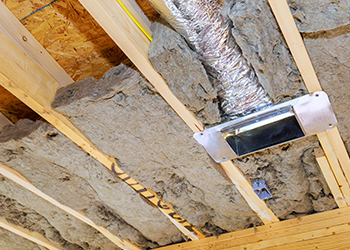 When it comes to maintaining a comfortable and energy-efficient home or business, insulation and HVAC systems are two critical components that must work together seamlessly. While HVAC systems regulate indoor temperatures and air quality, insulation ensures that your building retains the treated air, reducing energy waste and optimizing HVAC performance. Let’s explore how proper insulation and HVAC systems go hand in hand to create a comfortable, efficient environment.
When it comes to maintaining a comfortable and energy-efficient home or business, insulation and HVAC systems are two critical components that must work together seamlessly. While HVAC systems regulate indoor temperatures and air quality, insulation ensures that your building retains the treated air, reducing energy waste and optimizing HVAC performance. Let’s explore how proper insulation and HVAC systems go hand in hand to create a comfortable, efficient environment.
The Role of Insulation
Insulation acts as a barrier that slows down the transfer of heat between the inside and outside of a building. During the summer, insulation keeps the cool air in and the heat out, while in the winter, it prevents warm air from escaping and cold air from seeping in. Without adequate insulation, your HVAC system must work harder to maintain the desired indoor temperature, leading to higher energy consumption and utility bills.
HVAC Systems: The Heart of Comfort
Heating, ventilation, and air conditioning (HVAC) systems are designed to control the temperature, humidity, and air quality of indoor spaces. An efficient HVAC system relies on the building envelope—walls, windows, doors, and, most importantly, insulation—to function effectively. When paired with proper insulation, HVAC systems can operate at optimal levels, reducing strain on the equipment and extending its lifespan.
How Insulation Enhances HVAC Performance
- Energy Efficiency: Proper insulation minimizes heat gain in the summer and heat loss in the winter, allowing the HVAC system to maintain the desired temperature with less effort.
- Reduced Operating Costs: With less strain on the HVAC system, energy consumption decreases, leading to lower utility bills.
- Improved Comfort: Insulation helps maintain consistent indoor temperatures, eliminating hot or cold spots that can occur in poorly insulated spaces.
- Environmental Impact: Reduced energy usage means a smaller carbon footprint, contributing to a more sustainable future.
- Extended HVAC Lifespan: When the HVAC system doesn’t have to work as hard, it experiences less wear and tear, reducing the need for repairs and replacements.
Choosing the Right Insulation
The effectiveness of insulation depends on its R-value, which measures its resistance to heat flow. The higher the R-value, the better the insulation. Factors to consider when choosing insulation include the climate, building design, and budget. Common types of insulation include fiberglass, spray foam, cellulose, and rigid foam boards.
Pairing Insulation with HVAC Upgrades
If you’re upgrading your HVAC system, it’s the perfect time to assess and improve your insulation. A well-insulated building allows you to install a smaller, more energy-efficient HVAC system, saving money upfront and in the long term. Conversely, upgrading your HVAC without addressing insulation deficiencies can result in suboptimal performance and higher operating costs.
Signs Your Insulation Needs an Upgrade
- Drafty areas or inconsistent temperatures
- High energy bills despite an efficient HVAC system
- Ice dams forming on the roof in winter
- Excessive noise from outside
- Older homes with original insulation that may have degraded over time
Partner with Experts for Maximum Efficiency
At MB HAYNES, we understand the importance of creating energy-efficient environments. Our HVAC and energy solutions are designed to work in harmony with your building’s insulation to provide maximum comfort and savings. Whether you need an HVAC system upgrade, an insulation assessment, or both, our team of experts is here to help.
Conclusion
Proper insulation and HVAC systems are a dynamic duo when it comes to energy efficiency and comfort. By ensuring your building is well-insulated, you can optimize HVAC performance, save on energy costs, and reduce your environmental impact. Contact MB HAYNES today to learn how we can help you achieve the perfect balance between insulation and HVAC for your home or business. For more information on our Heating and Cooling services visit: https://www.mbhaynes.com/haynes-heating-cooling/#residential
